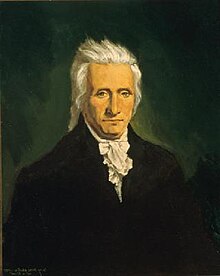
Back غابرييل دوفال Arabic جابرييل دوفال ARZ قابریل دووال AZB Gabriel Duvall German גבריאל דובאל HE Gabriel Duvall ID Gabriel Duvall Polish Gabriel Duvall Portuguese
Gabriel Duvall | |
|---|---|
 | |
| Associate Justice of the Supreme Court of the United States | |
| In office November 23, 1811 – January 14, 1835[1] | |
| Nominated by | James Madison |
| Preceded by | Samuel Chase |
| Succeeded by | Philip P. Barbour |
| Member of the U.S. House of Representatives from Maryland's 2nd district | |
| In office November 11, 1794 – March 28, 1796 | |
| Preceded by | John Mercer |
| Succeeded by | Richard Sprigg |
| Personal details | |
| Born | December 6, 1752 Prince George's County, Province of Maryland, British America |
| Died | March 6, 1844 (aged 91) Glenn Dale, Maryland, U.S. |
| Political party | Democratic-Republican |
| Spouse(s) | Mary Bryce (1787–1794) Jane Gibbon (1795–1834) |
| Signature | |
Gabriel Duvall (December 6, 1752 – March 6, 1844) was an American politician and jurist. Duvall was an Associate Justice of the Supreme Court of the United States from 1811 to 1835, during the Marshall Court. Previously, Duvall was the Comptroller of the Treasury, a Maryland state court judge, a member of the U.S. House of Representatives from Maryland, and a Maryland state legislator.
Whether Duvall is deserving of the title of "the most insignificant" justice in the history of the U.S. Supreme Court has been the subject of much academic interest, most notably a debate between University of Chicago Law Professors David P. Currie and (now-Judge) Frank H. Easterbrook in 1983. Currie argued that "impartial examination of Duvall's performance reveals to even the uninitiated observer that he achieved an enviable standard of insignificance against which all other justices must be measured."[2] Easterbrook responded that Currie's analysis lacked "serious consideration of candidates so shrouded in obscurity that they escaped proper attention even in a contest of insignificance," and concluded that Duvall's colleague, Justice Thomas Todd, was even more insignificant.[3]
- ^ "Justices 1789 to Present". Washington, D.C.: Supreme Court of the United States. Retrieved February 14, 2022.
- ^ Cite error: The named reference
c466was invoked but never defined (see the help page). - ^ Easterbrook, 1983, at 482, 496.
© MMXXIII Rich X Search. We shall prevail. All rights reserved. Rich X Search